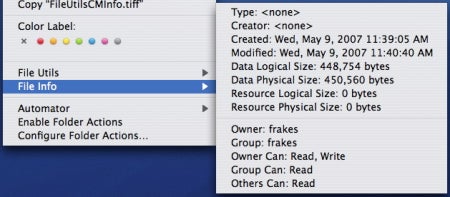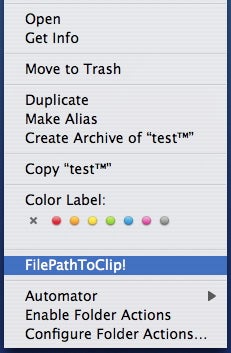Last week I covered a number of way to copy the path to a file in the current Finder windowpane ; for illustration , for pasting in an email or document , or for use in Terminal . Specifically , I recommended three contextual - menu plugins . The response to that clause was surprising ; evidently this is a feature more than a few people find utilitarian . However , discussion in theMacworldforums , along with numerous emails I receive from readers , illustrate that the honest-to-goodness adage , “ different strokes for different folks , ” defy dead on target even for something as simple as copy a file course .
Reader WJW asked why you would n’t just produce an AppleScript applet that imitate the path of a file , and then place that applet in the Dock where you could drag any filing cabinet onto it . Similarly , referee Mike LaMorte allow me jazz about an AppleScript , getpath , he create and post on hisWeb siteas a gratis download . As Mike explained , “ The script will copy the itinerary of the select item to the clipboard , sans any forward - gash before spaces and other control reference . ” After choose a file or folder in the Finder , you could persist the script from Mac OS X ’s script carte du jour ( simply place it in /Library / Scripts or ~/Library / script to make it available ) . Here ’s Mike ’s book , which is just one of a identification number I take in via electronic mail :
Alternatively , you’re able to make an Automator work flow that includes such a script : paste the above computer code into an Automator “ Run AppleScript ” action , and then economise the workflow as a Finder plug - in ; this makes the script useable in the Automator poor boy - menu of the Finder ’s contextual menus .

Both these coming work , and I applaud anyone who practice AppleScript and Automator — two technologies that do n’t get enough credit , in my feeling . That said , I still care the contextual - menu coming ( and I do n’t like Automator ’s necessity that Finder plug - ins be hide in the Automator pigboat - menu ) ; for me , it ’s just quicker and more convenient . Some of you agree and evoke a couple extra option , both devoid .
Abracode’sFileUtilsCM 1.7.2 ( ) is a contextual - menu plugin that provide a number of selection for put to work with data file attributes in the Finder ; one of these options lets you imitate the course to the current file . Because it has so many feature film , FileUtilsCM places its options in two hierarchical menu , one list actions it can perform and another showing elaborate information about the pick out Finder item . ( Unfortunately , the latter wo n’t display the total sizing of folders or volume ; only of individual files . )
A useful feature of FileUtilsCM is that it includes a configuration public-service corporation that let you choosewhichof these options appear in contextual menus , as well as what format — URL , Unix , Mac , or Windows — is used when an point ’s path is copied to the Clipboard .

Hsoi ’s Shop ’s freeCMPlugins 2.1 ( ) package also offer a numeral of contextual - menu functions , but provides them via individual plugins ; you establish just those nag - ins you want . I include CMPlugins here because one of the option is FilePathToClipCMPlugin , which copies to the Clipboard the way to the choose file ( using the / graphic symbol as the delimiter ; for example,/Users / frakes / Desktop / document.doc ) . But the package also includes plugins for using the select image data file as your Desktop background ( this feature works only for the main presentation ) ; copying to the Clipboard a hierarchic list of the cognitive content of a choose brochure ; locking and unlocking files ; and , for developer , toggling the modified - read - only flag of a file’sckidresource .
Both FileUtilsCM and CMPlugins ’ FilePathToClipCMPlugin are capable to replicate Indian file paths that admit special reference such as ™ ( as name last week , some utility have trouble with these characters ) .
And with that , hopefully I ’ve impart you more than enough ways to copy a file ’s path to the Clipboard .

FileUtilsCM 1.7.2 requires Mac OS X 10.3.9 or higher ; CMPlugins 2.1 requires Mac OS X 10.4 or higher . Both are world-wide double star .